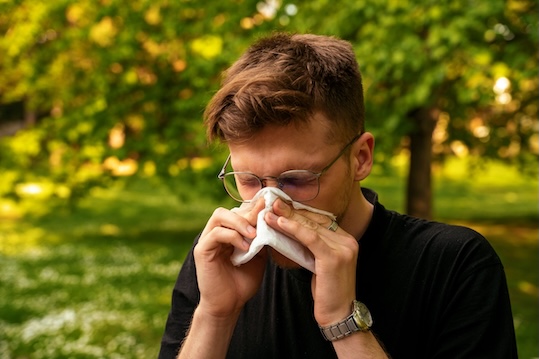Disclaimer: This information is not a substitute for professional medical advice, diagnosis or treatment.
Spring is springing, and with it, so are allergy symptoms in the form of sneezing, blocked or runny nose, itchy eyes, sinus pressure and headaches. Dr James Harris has provided his tips for managing seasonal allergies but first, let’s dive into what causes seasonal allergy symptoms in the first place.
What is a pollen allergy?
Pollen is made up of fine grains released from grasses, weeds and trees to fertilise other plants. It’s carried by insects, birds or the wind and can travel long distances from where it originated.
For some people, pollen triggers the immune system to launch a defensive response, involving the release of chemicals like histamine.
Note – Histamine is produced and released by certain immune cells in the body, in a non-allergic response, it plays a role in fighting infections, healing injuries or expelling harmful substances
When the body mistakes harmless substances like pollen (or dust and pet dander) for dangerous invaders, it triggers the release of histamine which can cause:
- Itchy or watery eyes
- A blocked or runny nose (known as hay fever or allergic rhinitis)
- Sneezing and facial pressure
Doctor Harris’ tips for managing seasonal allergies
To effectively manage seasonal allergies, a multi-pronged approach including preventative measures, over-the-counter medications, and, in some cases, prescription treatments or specialist referral may be appropriate. Staying indoors during high pollen times, using air filtration and practicing good hygiene may also assist in reducing exposure and symptoms.
Preventative measures:
- Monitor pollen counts and forecasts: Stay informed about pollen levels in your area and adjust your outdoor activities accordingly
- Limit outdoor exposure: Spend more time indoors during peak pollen times, especially on windy days
- Keep windows and doors closed: Use air conditioning with a HEPA filter to reduce pollen and other allergens indoors
- Shower after outdoor activities: Rinse off pollen from your skin and hair
- Change and wash clothes: Remove and wash clothing worn outdoors to eliminate pollen accumulation
- Dry clothes indoors: Avoid drying clothes outside, as pollen can stick to them
- Consider nasal rinses: Saline rinses may help clear nasal passages of allergens
Over the counter medications
- Antihistamines: Oral antihistamines may help relieve symptoms like runny nose, itchy eyes, and sneezing
- Decongestants: Nasal decongestant sprays may temporarily ease stuffiness, but use them sparingly due to the risk of potential rebound congestion
- Steroid nasal sprays: These sprays may help reduce inflammation and control symptoms like a runny nose and sneezing
- Eye drops: Certain eye drops may provide relief for itchy, watery eyes
Always check with your pharmacist or doctor to make sure these options are appropriate for your situation.
Speak to a doctor
Book an appointment or join the queue to speak with Dr James Harris or one of our 200+ experienced and Australian-registered doctor at a time that suits you.










